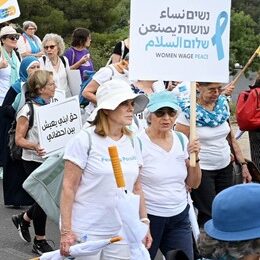Organizations and activists dedicated to promoting peace between Israelis and Palestinians have been facing significant challenges in the wake of the Hamas attack on Israel on Oct. 7 and the ensuing Israel-Hamas war in the Gaza Strip.
But they are still working to keep the lines of communication open and reaching out to their members and alumni to offer support.
Ittay Flescher, education director of youth peace organization Kids4Peace in Jerusalem, told The Media Line that activities had come to a stop because of the war, but his organization was still making efforts to help members.
“Like the whole country, we are on pause now,” he said. “We have written messages to the kids and the parents letting them know that we are thinking of them, and we are doing our best to support our team. Sometimes it’s just a message of support, and sometimes it’s just crying together.”
We find a tiny silver of hope in the fact that 133 of our alumni, Israeli and Palestinian, have thus far attended Zoom dialogues, and in the fact that our WhatsApp groups are full of much more support that pointing fingers or anger
Adnan Jaber, alumni board member of Tech2Peace, an NGO that provides high-tech and entrepreneurial training and conflict dialogue to young Israelis and Palestinians, also said the organization was working to help its alumni, holding Zoom meetings and talks to offer support.
“We find a tiny silver of hope in the fact that 133 of our alumni, Israeli and Palestinian, have thus far attended Zoom dialogues, and in the fact that our WhatsApp groups are full of much more support that pointing fingers or anger,” he told The Media Line.
This holiday season, give to:
Truth and understanding
The Media Line's intrepid correspondents are in Israel, Gaza, Lebanon, Syria and Pakistan providing first-person reporting.
They all said they cover it.
We see it.
We report with just one agenda: the truth.


Tarrie Burnett, the executive director of Tomorrow’s Women, a leadership organization for young Israeli and Palestinian women, recently announced that the organization had decided to provide therapeutic support.

Tarrie Burnett, executive director of Tomorrow’s Women. (Courtesy)
“We are thinking of getting a trauma therapist online and meeting with groups or individuals who want that support right now,” she told The Media Line.
Shir Yerushalmi, a 26-year-old student studying economics and political science at the Hebrew University of Jerusalem and a member of the Standing Together political movement, told The Media Line that since the war began, Palestinians and Israelis have come together for Zoom meetings to discuss the situation in a space space.
“A few days after the Hamas attack, we met on Zoom and shared our feelings, you know Israelis and Palestinians, and that in itself is something very rare to happen,” she said.
Sue Levenstein, a 74-year-old activist in the organization Women Wage Peace, spoke of the irony of her friend Vivian Silver, also a peace activist in the same organization, being killed in the Hamas attack. Silver was initially believed to have been taken hostage into the Gaza Strip from her home in Kibbutz Be’eri, but her remains were identified five weeks later at the kibbutz.
“Someone like Vivian, who worked her whole life to be in a peace movement, who worked with Palestinians in Gaza for many years and has friends there, she knows them personally, she believes in peace, she believes in equality, she believes in freedom for everyone, and a person like her was [killed],” Levenstein said.

Vivian Silver holds up a sign as she marches with Women Wage Peace and Women of the Sun a few days before the Hamas attack, Jerusalem, Oct. 4, 2023. (Courtesy Women Wage Peace)
Burnett said the peace organizations still see hopeful signs for the future.
“In the darkest hour, on the night of October 7, a young woman from the West Bank applied to Tomorrow’s Women to come to camp. For us that’s hope; someone can look into the eye of the monster, and still choose peace,” she said.
We all come together with the same message, we are all mothers, and we don’t want to see our children go to war
Levenstein said that all the women in Women Wage Peace joined for the same reason and that they continue in the organization for the sake of a better future for their children.
“We all come together with the same message, we are all mothers, and we don’t want to see our children go to war. As mothers, we don’t want to give up on the hope of reaching peace,” she said.
Flescher said that the number of people hoping for a peaceful resolution to the Israeli-Palestinian conflict had fallen during the war, and this would be a concern once the war was over.
“Before the war, not many people believed in peace, and after the war, that number will become very much less. But I still believe you can’t kill your way to peace,” he said.
Lana Ikelan is a recent graduate of the Hebrew University of Jerusalem and an intern in The Media Line’s Press and Policy Student Program.